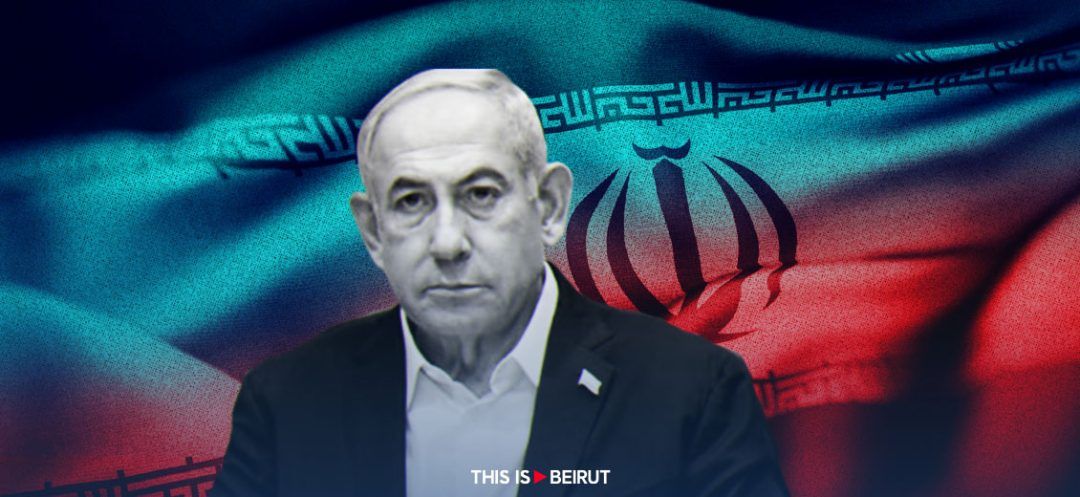- Home
- War in the Middle East
- Damascus Attack: Netanyahu’s Evolving Red Lines Against Iran and Its Proxies

Almost six months into Israel’s quest to destroy Hamas, Israeli Prime Minister Benjamin Netanyahu is still adamant on pushing ahead with his escalatory military policy, notwithstanding global pressures, notably by its US ally, to cease fire.
The Israeli strike in Damascus on Monday which flattened a building that is part of the Iranian embassy complex, killing senior commanders of Iran’s Revolutionary Guards Corps (IRGC), is the biggest attack yet on Iranian interests in Syria, and a blunt act that somehow exposed the covert war that has been going on between Israel and Iran through Tehran’s proxies.
Netanyahu’s combative attitude and provocative performance is meant to keep him in power. He is also being challenged by his far-right coalition partners, some of whom threatened to bring down the government if he strays from his hardline policy.
With his political survival at stake, the Israeli premier’s only strategy and logic is to stay in power, according to retired French army General Dominique Trinquand.
“The extension of the conflict doesn't frighten him, because war is what allows him to stay in power and continue to apply the policy he's been applying for 15 years. Extending the conflict against the Iranians in Damascus and against Hezbollah is a necessity for him,” Trinquand told This is Beirut.
“Netanyahu couldn't care less about the UN resolution calling for an immediate ceasefire in Gaza, and pays little attention to what his American allies think,” Trinquand added.
He argued that change may come from within Israel itself, amid growing public discontent with Netanyahu’s war policy that has so far failed to achieve the twin aims of destroying Hamas and freeing the hostages still held by the Islamist Palestinian faction in Gaza.
“The only way out of the crisis is that the Israelis manage to push Netanyahu out the door. Street demonstrations may drive his cabinet to split, at which point he will have to leave, but as long as there isn't this kind of pressure, external pressure won't do much,” the French general maintained.
As the red lines that he sets for himself keep on evolving, the logic that drives Netanyahu's decision-making process continues to change and becomes ever more complex.
For Fadi Assaf, co-founder of Middle East Strategic Perspectives, Israel remains the “unknown” or “unpredictable” party in the raging conflict, whereas Iran has been avoiding head-on confrontation and keeping its proxies firmly under control.
"Israeli raids against Iranian military and logistical interests in Syria, and even cyberattacks on Iranian soil itself, have not modified Iran's posture,” Assaf told This is Beirut, stressing that “the real foundations of the ‘strategic patience’ that dictates Iran's reactions on the Israeli front remain unchanged even today (after the Damascus attack).”
At least three senior commanders and four officers overseeing Iran’s covert operations in the Middle East were killed on Monday when Israeli warplanes struck an annex building of the Iranian Embassy in Damascus, an unprecedented direct confrontation in the adversaries’ escalating conflict over the war in Gaza.
Iran vowed to take revenge on Israel, with Iranian Supreme Leader Ali Khamenei pledging, “We will make the Zionist regime regret this crime and others it has committed.”
While the US administration is playing the “de-escalation card,” and at the same time maintaining its logistical and military support for Israel, the latter is continuing its offensive against Hamas, in Gaza and at Rafah, and its surgical war against Hezbollah and the IRGC.
According to Assaf, Israel’s aim here is to create the conditions for a deal that is most advantageous for its security.
“Weakening Iran by clipping its armed wings and thus limiting its ability to impose its conditions in inevitable future negotiations seems to be the primary objective of Israel's current military actions,” Assaf said, adding that, on the other hand, Iran’s primary concern is to protect its constellation of militias, and “above all avoid risking the loss of Hezbollah, in order to preserve its geostrategic gains.”
Despite taking risks here and there, both sides seem, for the time being, to be acting in a manner consistent with their current strategic priorities.
Iran’s retaliation to the Damascus attack, as vowed by Khamenei, is, thus, unlikely to happen straight away, but could target Israeli interests anywhere in the world later, on the model of the 1992 attack on the Israeli embassy and another attack on a Jewish community center in 1994, both in Buenos Aires. A Hezbollah suicide bomber was charged with carrying out the attack on the Jewish center.
Read more



Comments